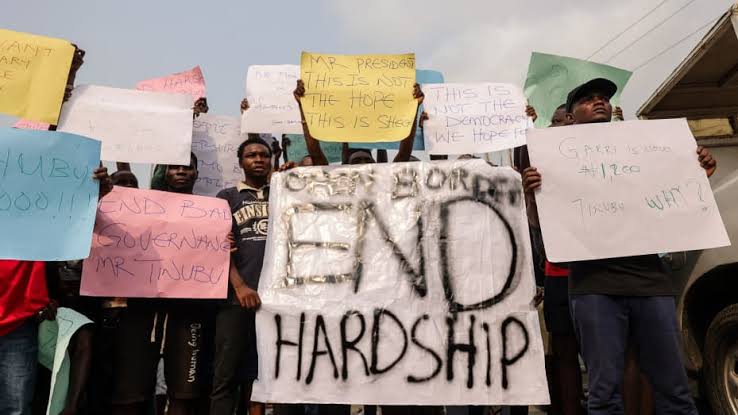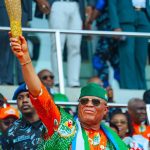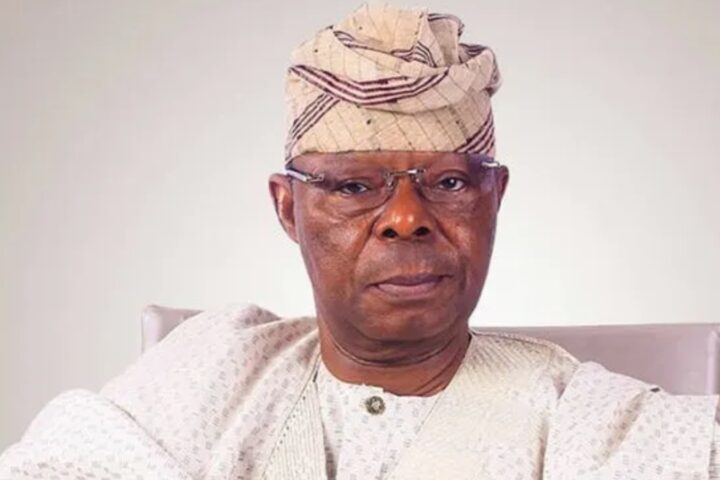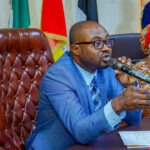Economic Hardship: Nigerians Demand Action, Not Just Prayer
Nigeria’s economic hardship has reached a peak, affecting millions nationwide. As prayers are scheduled for the coming weeks to seek divine help, some citizens and experts express that while prayer is important, concrete action is even more essential.
For instance, Ifeoma Akuma, a market trader in Oshodi Lagos, said, “We pray every day. But when prices go up, prayer alone can’t bring them down. We need our leaders to make things better for us.” Amina’s sentiment reflects the views of many Nigerians who are struggling with inflation, rising fuel prices, and declining job opportunities.
Join our WhatsApp ChannelMixed Reactions from Citizens
Following the announcement that First Lady Oluremi Tinubu and National Security Adviser, Nuhu Ribadu, would lead national prayers to address Nigeria’s challenges, there have been mixed reactions. Organised with both Christian and Muslim leaders, the prayer events aim to seek divine intervention to ease the country’s financial and social issues. However, many Nigerians believe that prayer alone will not be enough to overcome these obstacles.
Jide Akintunde, a Lagos-based mechanic, shared, “I have nothing against prayer. But it won’t fill my tank with fuel or put food on my table. We need changes in policy, not just prayers. God has given everything man needs to succeed, we just need to tap into the right ones.” His comment highlights a common concern: that religious gatherings, while valuable, might deflect attention from much-needed governmental reforms and policy action.
Experts Weigh In: “Prayers Support, Actions Lead”
Economic experts have voiced their perspectives on the balance between prayer and action. Professor Ifeanyi Okonkwo, an economist, emphasised that spiritual practices can bring comfort but cannot substitute for effective policy. “Countries succeed not just because they pray but because they invest in good policies and infrastructure,” he explained. “Nigeria has immense potential, but without action, prayer alone won’t make a difference in poverty rates or the economy.”
READ ALSO: Examining The Nation’s Future Amid Economic Hardships
Similarly, a political analyst, Dr. Aisha Bello, believes that while prayer can inspire unity, it should not be the sole solution to the nation’s problems. “We need to tackle inflation, insecurity, and poor infrastructure head-on. Prayers can only support what we do in reality. Concrete measures are needed to bring Nigeria out of economic hardship.”
Living Amidst Economic Hardship: Realities from Everyday Nigerians
The struggles of everyday Nigerians underscore the pressing need for actionable solutions. In Isolo, Bayo Ojo, a young father, speaks of his frustration with the current economic state: “I work hard, yet I can barely provide for my family. With the rise of fuel and food prices, we go to bed hungry sometimes. We need change. We pray, but I feel prayer alone cannot solve our economic hardship. We need leaders who truly care about making a difference.”
Meanwhile, Fatima Ali, a school teacher who also does odd jobs, expressed her concerns about the rising costs of daily necessities. “I spend nearly my entire salary on food and transport. Yes, we are a religious country, but we can’t just wait for miracles. Our leaders need to work on stabilising prices and providing jobs.” she said, echoing a sentiment shared by millions.
Fatima’s perspective reflects a broader feeling that the root causes of Nigeria’s struggles—such as inflation and unemployment—require effective policy solutions.
A Call for Change: What Nigerians Want Beyond Prayers
The question remains: What practical actions are Nigerians hoping to see from their leaders? For many, the solution involves specific, transparent steps toward economic reform.
Grace Ayodele, a civil servant, remarked, “If leaders took steps to fix the power sector, it would relieve so many people. We wouldn’t have to spend on generators and fuel. Prayer helps spiritually, but let’s see action too.”
Bankole Adebayo, a student activist in Port Harcourt, shares a similar view: “If the government focuses on education and job creation, young people like me would have a future. We need opportunities, not just hope that things will change by themselves.”
These Nigerians are calling for structural reforms in areas such as education, job creation, and security, in addition to spiritual practices. Many believe that tackling these core issues can lead to sustainable progress and that only then can prayer complement the efforts of citizens and leaders.
Are Leaders Ready to Take Action?
While some political leaders have responded by joining the prayer initiative, questions linger about the government’s readiness to implement effective measures. The National Security Adviser, Nuhu Ribadu, known for his experience in coordinating security, is also part of the prayer campaign. However, citizens like Sola Adekunle, a retired teacher, question his involvement, stating, “Instead of praying, he should be focusing on securing our country. Our leaders need to focus on their primary duties and let the citizens pray if they wish to.”
Experts agree that the government’s responsibility is to provide a stable and secure environment. Dr. Aisha Bello explains, “Ribadu’s role should be centred around strengthening our security apparatus, not leading prayer gatherings. Prayers are good, but they cannot address the practical issues facing our nation.”
Building Nigeria’s Future with Faith and Action
Despite their frustrations, many Nigerians maintain hope. They envision a future where faith is supported by practical actions to create a balanced approach to governance.
As Pastor Emmanuel Ajayi, from Redeemed Christian Church of God (RCCG) from Lagos puts it, “Faith without action is dead. Our leaders should embrace this, not just by words but by making policies that uplift Nigerians. We can’t ignore prayer, but action is what will bring change.”
This belief is reinforced by Imam Ibrahim Abdullahi in Oshodi, who believes that “while prayer strengthens us, our leaders must act wisely. Prayer is a reminder of hope, but it is through our hands and choices that change happens.”
Moving Forward: Faith with Accountability
The economic hardship in Nigeria is an urgent issue that requires both faith and accountability. Citizens, experts, and religious leaders agree that while prayer can provide strength and hope, tangible solutions must follow. It is through effective policies, transparency, and a commitment to improving citizens’ lives that Nigeria can begin to overcome its current challenges.
In the words of Chika Udeh, an electronic small business owner in Lagos, “I hope our leaders are listening. We pray every day, but we also need help. With the right actions, I believe Nigeria can rise above this economic hardship.”
For Nigeria, the journey forward must be marked by a union of faith and concrete actions. Only then can the country navigate its way through these difficult times and realize the potential that so many citizens believe lies within.
Emmanuel Ochayi is a journalist. He is a graduate of the University of Lagos, School of first choice and the nations pride. Emmanuel is keen on exploring writing angles in different areas, including Business, climate change, politics, Education, and others.


















Follow Us